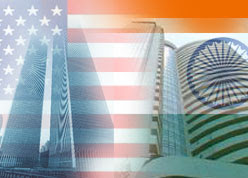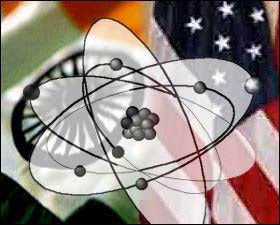
Key benchmark indices saw strong start after the 45-nation Nuclear Supplier Group (NSG) on Saturday, 6 September 2008 reached a consensus on the crucial Indo-US nuke deal agreeing on a clean waiver for India. A solid surge in Asian stocks also aided the strong upmove on the domestic bourses.
Capital goods, telecom shares rallied on fresh buying. The market breadth was strong. All the 30-members from the Sensex pack gained. Ranbaxy Laboratories rebounded in green.
Shares of potential beneficiaries of the India-US nuclear deal surged, with NTPC, Bharat Heavy Electricals and Larsen & Toubro surging over 5% each.
Asian markets surged today, 8 September 2008, after the US government on Sunday, 7 September 2008, took over mortgage finance firms Fannie Mae and Freddie Mac to limit extensive damage of the financial crisis. Key benchmark indices in Japan, Hong Kong, Taiwan, Singapore, South Korea were up by between 3.38% and 5.57%. However, China's Shanghai Composite was down 1.95%
At 12:25 IST, the BSE 30-share Sensex was up 580.80 points or 4.01% to 15,065.13. It opened 554.23 points higher at 15,034.06 and surged to strike an intra-day high of 15,107.01 in early trade. At the day’s high, the Sensex gained 623.18 points. At the day’s low of 14,989.64 hit in mid-morning trade, the Sensex rose 505.81 points.
The S&P CNX Nifty jumped 167.70 points or 3.82% to 4,519.50
The NSG’s acceptance of the US proposal to drop a ban on nuclear trade with India will now put the Indo-US nuclear deal on the fast track. The approval came after almost three days of meeting in Vienna, ending a three-decade-long ban on India buying materials related to nuclear energy. The NSG meet was called to minimise any damage to the Non-Proliferation Treaty, which India has not joined.
However, the nuclear deal still needs to be ratified by the US Congress before it could take force. The Congress must act before adjourning in late September 2008 for US presidential elections. If that does not happen, the deal could be left to an uncertain fate under a new US administration that takes office next year.
The market breadth was strong on BSE with 1772 shares advancing as compared to 646 that declined. 83 remained unchanged.
The BSE Mid-Cap index rose 1.92% to 5,861.81 and the BSE Small-Cap index gained 1.63% to 7,017.44.
The total turnover on BSE amounted to Rs 2034 crore by 12:30 IST as compared to Rs 1510 crore by 11:30 IST.
All the 30 Sensex stocks were in the green. Ranbaxy, India’s top drug maker by sales, recovered from day’s low of Rs 438.05 and was now up 1.05% to Rs 455. The Japanese drug maker Daiichi Sankyo’s open offer to acquire an additional 20% stake at Rs 737 a share in the company ended on 4 September 2008.
India’s largest private sector power generation firm by sales, Reliance Infrastructure jumped 7.50% to Rs 1092 on 5.44 lakh shares. It was the top gainer from Sensex pack.
Capital goods heavyweights Larsen & Toubro (up 5.95% to Rs 2772), and Bharat Heavy Electricals (up 5.55% to Rs 1827.90), surged.
India’s largest private sector firm by market capitalization and oil refiner Reliance Industries (RIL) advanced 3.55% to Rs 2153.30 on 3.90 lakh shares.
Telecom pivotals were in demand on renewed buying interest. India’s second largest cellular services provider in terms of market capitalisation Reliance Communications advanced 3.82% to Rs 409 after its subsidiary Reliance Big Entertainment reportedly acquired a majority stake in the US-based cricket webcasting portal, Willow TV, for an undisclosed amount.
India’s largest cellular services provider in terms of market capitalisation Bharti Airtel rose 1.54% to Rs 817.25
India’s second largest software services exporter Infosys Technologies gained 2.06% to Rs 1748.60 and ICICI Bank, the country’s largest private sector ban by net profit jumped 6.57% to Rs 732.45
Aurobindo Pharma rose 0.95% to Rs 319.05 after the company said it has secured tentative approval from US Food & Drug Administration to manufacture and market Abacavir Sulphate/Lamivudine tablets. The company made this announcement during trading hours today, 8 September 2008.
Pratibha Industries surged 3.11% to Rs 278.60 after the company said on Monday, 8 September 2008, it has secured a contract worth Rs 44.75 crore from Delhi Jal Board for water transmission program.
New York's main contract, light sweet crude for delivery in October 2008 rose $2.37 to $108.60 per barrel today, 8 September 2008 on worries hurricane Ike will threaten production facilities in the oil-rich US Gulf Coast.
US markets ended mixed on Friday, 5 September 2008 after financial shares rebounded on hopes that concrete measures would be taken to rescue mortgage companies Fannie Mae and Freddie Mac. The Dow Jones industrial average roe 32.73 points, or 0.29%, to 11,220.96. The Standard & Poor's 500 index gained 5.48 points, or 0.44%, to 1,242.31. However the Nasdaq composite index slid 3.16 points, or 0.14%, to 2,255.88.
Back home, intense selling in index pivotals ever since the opening bell led a sell-off on the bourses on Friday, 5 September 2008. The BSE 30-share Sensex lost 415.27 points or 2.79% to 14,483.83 and the S&P CNX Nifty declined 95.45 points or 2.15%, to settle at 4352.30.





